高二英语外研版选修7学案:课堂导学Module5 EthnicCulture含解析
外研版选修七Module 5《Ethnic Culture》word教案
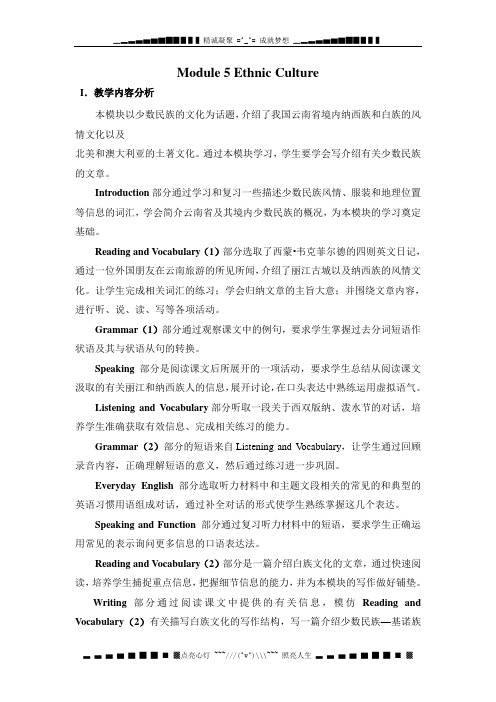
Module 5 Ethnic CultureI.教学内容分析本模块以少数民族的文化为话题,介绍了我国云南省境内纳西族和白族的风情文化以及北美和澳大利亚的土著文化。
通过本模块学习,学生要学会写介绍有关少数民族的文章。
Introduction部分通过学习和复习一些描述少数民族风情、服装和地理位置等信息的词汇,学会简介云南省及其境内少数民族的概况,为本模块的学习奠定基础。
Reading and Vocabulary(1)部分选取了西蒙•韦克菲尔德的四则英文日记,通过一位外国朋友在云南旅游的所见所闻,介绍了丽江古城以及纳西族的风情文化。
让学生完成相关词汇的练习;学会归纳文章的主旨大意;并围绕文章内容,进行听、说、读、写等各项活动。
Grammar(1)部分通过观察课文中的例句,要求学生掌握过去分词短语作状语及其与状语从句的转换。
Speaking部分是阅读课文后所展开的一项活动,要求学生总结从阅读课文汲取的有关丽江和纳西族人的信息,展开讨论,在口头表达中熟练运用虚拟语气。
Listening and Vocabulary部分听取一段关于西双版纳、泼水节的对话,培养学生准确获取有效信息、完成相关练习的能力。
Grammar(2)部分的短语来自Listening and V ocabulary,让学生通过回顾录音内容,正确理解短语的意义,然后通过练习进一步巩固。
Everyday English部分选取听力材料中和主题文段相关的常见的和典型的英语习惯用语组成对话,通过补全对话的形式使学生熟练掌握这几个表达。
Speaking and Function 部分通过复习听力材料中的短语,要求学生正确运用常见的表示询问更多信息的口语表达法。
Reading and Vocabulary(2)部分是一篇介绍白族文化的文章,通过快速阅读,培养学生捕捉重点信息,把握细节信息的能力,并为本模块的写作做好铺垫。
Writing部分通过阅读课文中提供的有关信息,模仿Reading and Vocabulary(2)有关描写白族文化的写作结构,写一篇介绍少数民族—基诺族的文章。
导学案选修七Module5EthnicCulture

导学案选修七Module5EthnicCulture选修七 Module 5 Ethnic CultureStep 1 Have a try:Understand the words and their derivatives and the phrases. I 、Revise the following words.1.____________ n.少数民族→____________ adj .少数的 2.____________ adj .愚蠢的;傻的→____________ n.傻⽠3.____________ adj .稀松的;疏松的→____________ v.解开;放松;松开 4.___________ v.为……配备家具→____________ n.家具5.____________ adj .史前的→____________ adj .有历史记载的→____________ n.历史 6.____________ n.存在→____________ v.存在7.____________ n.暴露;显露→____________ v.暴露;显露 8.____________ v.促成→____________ n.促成;贡献9.____________ n.意识;认识→____________ adj .有意识的 10.____________ v.建议;提议→____________ n.提议11.____________ n.长度→____________ adj .长的 12.____________ v.(使)增⼤;(使)扩⼤→____________ adj .⼤的 13.____________ n.缺乏;没有→____________ adj .缺席的 14.____________ n.指导;引导→____________ v.指导 II 、Recite the following words1.The ________(风俗)of naming women after flowers is becoming less common. 2.He'll ____________(继承)the title on the death of his uncle. 3.____________(显然)water is essential to the growth of crops.4.The hotel is not responsible for any loss or damage to guests' personal _______(财产).5.At the formal party I felt very ____________(尴尬的)and out of place. 6.I heard my friend call after me ,but I____________(不理)him. 7.This ____________(纪念碑)was built in memory of him. 8.The ____________(居民)of the i sland were friendly.9.It is not easy to ________(估计)how many people have the disease. 10.They all want to come to a____________(妥协).2.____________有……⼈⼝ 3.____________出发;动⾝ 4.____________调整;使适合 5.____________遇见6.____________⾄关重要7.____________除……之外 8.____________使某⼈想起某事 9.____________受……⽀配10.___________因……⽽受到尊敬 Step 2 Enphasis the sentences1.The Bai ethnic group has a population of around two million ,____________ live in Yunnan. ⽩族⼤约有两百万⼈,其中90%的⼈⼝⽣活在云南省。
外研版高中英语选修7《Module 5 Ethnic Culture》(Section 3)word教案
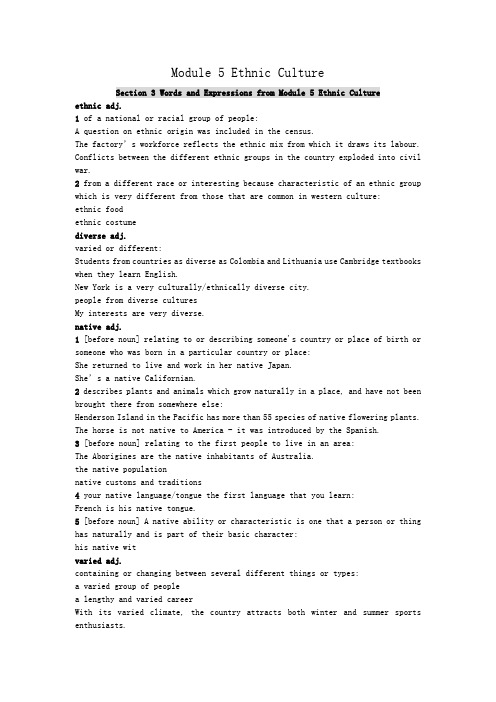
Module 5 Ethnic CultureSection 3 Words and Expressions from Module 5 Ethnic Cultureethnic adj.1 of a national or racial group of people:A question on ethnic origin was included in the census.The factory’s workforce reflects the ethnic mix from which it draws its labour. Conflicts between the different ethnic groups in the country exploded into civil war.2 from a different race or interesting because characteristic of an ethnic group which is very different from those that are common in western culture:ethnic foodethnic costumediverse adj.varied or different:Students from countries as diverse as Colombia and Lithuania use Cambridge textbooks when they learn English.New York is a very culturally/ethnically diverse city.people from diverse culturesMy interests are very diverse.native adj.1 [before noun] relating to or describing someone's country or place of birth or someone who was born in a particular country or place:She returned to live and work in her native Japan.She’s a native Cali fornian.2 describes plants and animals which grow naturally in a place, and have not been brought there from somewhere else:Henderson Island in the Pacific has more than 55 species of native flowering plants. The horse is not native to America - it was introduced by the Spanish.3 [before noun] relating to the first people to live in an area:The Aborigines are the native inhabitants of Australia.the native populationnative customs and traditions4 your native language/tongue the first language that you learn:French is his native tongue.5 [before noun] A native ability or characteristic is one that a person or thing has naturally and is part of their basic character:his native witvaried adj.containing or changing between several different things or types:a varied group of peoplea lengthy and varied careerWith its varied climate, the country attracts both winter and summer sports enthusiasts.run v.1 [I or T] to (cause to) operate:Keep clear of the machines while they’re running.The government took desperate measures to keep the economy running.Do you know how to run this sort of machinery?The mechanic asked me to run (= switch on and allow to work) the engine for a minute. They had the new computer system up and running (= working) within an hour. We’ve run the computer program, but nothing happens.We’re running (= doing) an experiment.2 [T] to be in control of:He’s been running a restaurant/his own company since he left school.The local college runs (= provides) a course in self-defence.a well-run/badly-run organization/business/course3 [T] If you run a car, you own one, drive it and pay for the costs:I can’t afford to run a car.4 [T] to organize the way you live or work:Some people run their lives according to the movements of the stars.inherit v.to receive money, a house, etc. from someone after they have died:Who will inherit the house when he dies?All her children will inherit equally.She inherited a fortune from her father.policies inherited from the previous administrationcustom n.a way of behaving or a belief which has been established for a long time:a local/ancient custom[+ to infinitive] In my country, it’s the custom (for women) to get married in white. splash v.1 [I or T; usually + adverb or preposition] If a liquid splashes or if you splasha liquid, it falls on or hits sth. or someone:Water was splashing from a hole in the roof.Unfortunately some paint splashed onto the rug.She splashed her face with cold water.She poured a large gin and splashed soda into it from a siphon.2 [I usually + adverb or preposition] to move in water so that drops of it go in all directions:The kids were splashing (about/around) in the shallow end of the swimming pool. farmn.1an area of land, together with house and buildings, used for growing crops and/or keeping animals as a business:a dairy/arable farmfarm animalsfresh farm producefarm workers2 a place where a particular type of animal is raised in large numbers to be sold:a sheep/fish/mink farmv. to use land for growing crops and/or raising animals as a business:The Stamfords have farmed this land for over a hundred years.lame adj.(especially of animals) not able to walk correctly because of physical injury to or weakness in the legs or feetThe horse went lame.firm adj.1 well fixed in place or position:The bridge provided a firm platform for the bungee jumpers.2 fixed at the same level or opinion and not changing:The government remains firm in its opposition to tax reform.rigid adj.stiff or fixed; not able to be bent, moved, changed or persuaded:a rigid steel and concrete structureI was rigid with (= stiff and unable to move because of) fear.DISAPPROVING We were disappointed that they insisted on such a rigid interpretation of the rules.fasten v.1 to (cause sth. to) become firmly fixed together, or in position, or closed: Make sure your seat belt is securely fastened.This shirt fastens at the back.2 fasten sth. on/to/together, etc. to fix one thing to another:I fastened the sticker to the windscreen.fold v.1 [I or T] to bend sth., especially paper or cloth, so that one part of it lies on the other part, or to be able to be bent in this way:I folded the letter (in half) and put it in an envelope.He had a neatly folded handkerchief in his jacket pocket.Will you help me to fold (up) the sheets?2 [T] to wrap:She folded her baby in a blanket.He folded his arms around her.3 fold your arms to bring your arms close to your chest and hold them together4 [T] to move a part of your body into a position where it is close to your body: She sat with her legs folded under her.adjust v.1to change sth. slightly, especially to make it more correct, effective, or suitable: If the chair is too high you can adjust it to suit you.As a teacher you have to adjust your methods to suit the needs of slower children.2 to arrange your clothing to make yourself look tidy:She adjusted her skirt, took a deep breath and walked into the room.furnish v.1 to provide with furniture; to put furniture in:They’ve furnished the room very simply.2 to provide someone with sth.:Furnished with maps, a compass and sandwiches, they set off for a day’s hiking. awkward adj.difficult to use, do, or deal with:It’s an awkward corner to drive round, so take it slowly.Some of the questions were rather awkward.It was an awkward ascent, but we reached the top eventually.[+ to infinitive] My car’s quite awkward to drive.He’s an awkward customer (= a difficult person to deal with).pierce v.1 [I + adverb or preposition; T] to go into or through sth., making a hole in it using a sharp point:The needle pierces the fabric four times a second.I couldn’t wear these earrings because my ears aren’t pierced.The gun fires a shell capable of piercing the armour of an enemy tank.The hole they drilled pierces 6 km into the earth’s crust.2[T] (of a light, sound, etc.) to suddenly be seen or heard, despite darkness, noise, etc:A few rays of sunlight pierced the smoke.piercing adj.1 going through or into sth.:Troops have been issued with new armour-piercing anti-tank grenades. FIGURATIVE We shivered in the piercing wind.2 describes a sound that is high, loud and unpleasant:piercing screams3 a piercing criticism/question/remark, etc. a criticism/question/remark, etc. which is unpleasant or uncomfortable because it is strong or it makes you think about or discuss something which you would prefer not to:She hadn’t really meant to lie, but their piercing questions had forced her to.4 piercing eyes/look/gaze/glance, etc. used to describe when a person looks very carefully at someone or sth., especially when they are trying to discover sth., often making people feel uncomfortable:Sherlock Holmes gave him a piercing glance.FIGURATIVE He looked straight at me with his piercing blue eyes.。
外研版选修七Module 5《Ethnic Culture》word学案
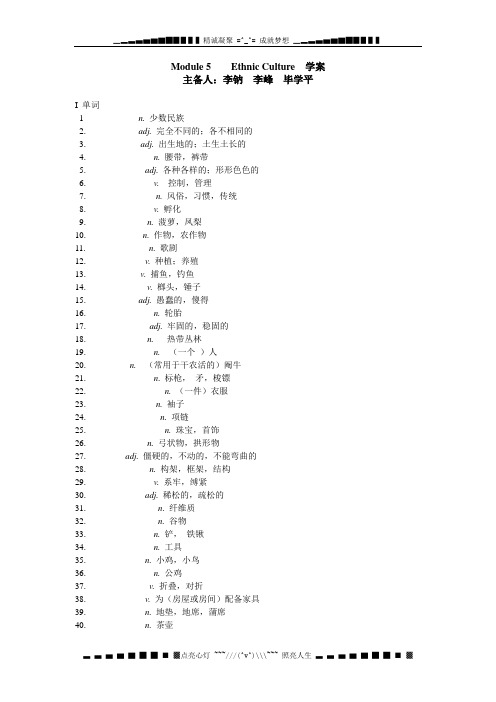
Module 5 Ethnic Culture 学案主备人:李钠李峰毕学平I 单词1____________ n. 少数民族2. ___________ adj.完全不同的;各不相同的3. ____________adj.出生地的;土生土长的4._______________ n.腰带,裤带5._____________ adj.各种各样的;形形色色的6. _______________v.控制,管理7. _______________ n.风俗,习惯,传统8. _______________v. 孵化9. _____________ n.菠萝,凤梨10. ____________ n.作物,农作物11.______________ n.歌剧12. _____________v.种植;养殖13.____________ v.捕鱼,钓鱼14. _____________ v.榔头,锤子15.____________adj.愚蠢的,傻得16._______________ n.轮胎17. ______________adj. 牢固的,稳固的18. _____________ n.热带丛林19. _______________n.(一个)人20. _________ n.(常用于干农活的)阉牛21._______________ n. 标枪,矛,梭镖22. _________________ n. (一件)衣服23. _______________ n.袖子24.________ ________ n.项链25. _________________ n.珠宝,首饰26. _____________ n.弓状物,拱形物27. ________ adj.僵硬的,不动的,不能弯曲的28. ______________n.构架,框架,结构29._______________ v. 系牢,缚紧30._____________ adj.稀松的,疏松的31.________________ n. 纤维质32.________________ n.谷物33._______________ n.铲,铁锹34._______________ n. 工具35._____________ n.小鸡,小鸟36._______________ n.公鸡37.______________ v.折叠,对折38._____________ v.为(房屋或房间)配备家具39._____________ n.地垫,地席,蒲席40._____________ n.茶壶41. ____________ n.腰,腰部42._____________ n. 寡妇,遗孀43._____________ n.侄子;外甥44. ____________ n. 汽车修理厂45. _____________adj. 尴尬的,为难的46. ________________n.彩虹47.____________ v.适应,使适应48.______________ n.采集者49. ____________ adv. 看起来;显然II 写出下列短语1 有…..人口__________________________2.有…的习惯__________________________3. 在远处___________________________ 3…的产地________________________4植物物种__________________________5.金丝猴____________________________6.亚洲象____________________________7.平方公里_________________________8.石林______________________________9.虎跳峡___________________________10. 少数民族_______________________11.传统服饰___________________________12.朝相反方向13.偶然遇见_________________________14.占…;编造;_____________________15.听说__________________________16.为…提供食宿,接待_________________17. 爱上,迷恋___________________18.仔细考虑_______________________19. 泼水节___________________________20. 把…泼溅到某人身上________________21. 痛苦的_______ ________________22. 盯着__________________________23. 动身去某处_______________________24. 做个手势__________________________25. 用…跟…固定在一起________________26. 使(自己)适和,适应某事____________27. 供给某人某物______________________28. 指向_____________________________29.结构坚固的木棍_____________________30.怎么会呢?___31.主要食物_________________________32. 感到尴尬________________________Introduction翻译下列名称:1. 少数民族_____________2. 热带雨林_____________3. 金丝猴_______________4. 亚洲象______________5. 平方公里_____________6. …的产地______________7. 植物物种_______________ 8. 石林________________ 9. 虎跳峡_________________ 翻译下列句子:1. 云南石是25个少数民族的大家庭,是中国最具多样性的地区。
高二英语外研版选修7学案:单词典句考点Module5 EthnicCulture含解析
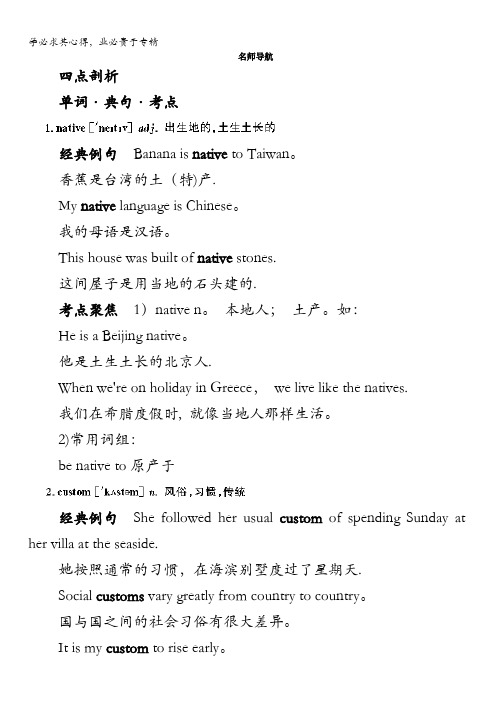
名师导航四点剖析单词·典句·考点经典例句Banana is native to Taiwan。
香蕉是台湾的土(特)产.My native language is Chinese。
我的母语是汉语。
This house was built of native stones.这间屋子是用当地的石头建的.考点聚焦1)native n。
本地人;土产。
如:He is a Beijing native。
他是土生土长的北京人.When we're on holiday in Greece,we live like the natives.我们在希腊度假时, 就像当地人那样生活。
2)常用词组:be native to原产于经典例句She followed her usual custom of spending Sunday at her villa at the seaside.她按照通常的习惯,在海滨别墅度过了星期天.Social customs vary greatly from country to country。
国与国之间的社会习俗有很大差异。
It is my custom to rise early。
早起是我的习惯。
考点聚焦1)custom还可以表示“关税;海关", 常用作复数形式。
如:the Customs海关At the airport,the Custom officers searched his case。
在机场,海关人员检查了他的箱子。
2)单词辨析:custom,habit, practice都含“习惯”的意思。
custom 指“经过一段时期在某人、一国、一地区或一个社会中形成的传统的习惯或风俗”。
如:In China the custom prevails in eating dumplings on New Year’s Eve。
在中国,除夕晚上吃饺子的风俗很盛行。
高二英语外研版选修7教案:Module5 EthnicCulture 2
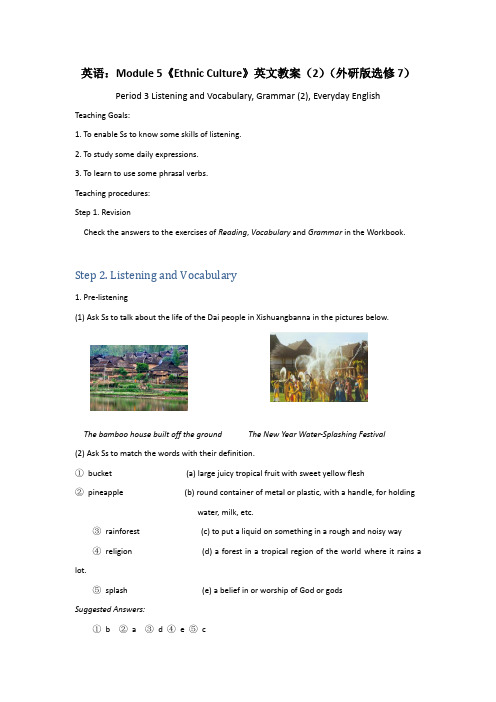
英语:Module 5《Ethnic Culture》英文教案(2)(外研版选修7)Period 3 Listening and Vocabulary, Grammar (2), Everyday English Teaching Goals:1. To enable Ss to know some skills of listening.2. To study some daily expressions.3. To learn to use some phrasal verbs.Teaching procedures:Step 1. RevisionCheck the answers to the exercises of Reading, Vocabulary and Grammar in the Workbook.Step 2. Listening and Vocabulary1. Pre-listening(1) Ask Ss to talk about the life of the Dai people in Xishuangbanna in the pictures below.The bamboo house built off the ground The New Year Water-Splashing Festival(2) Ask Ss to match the words with their definition.①bucket (a) large juicy tropical fruit with sweet yellow flesh②pineapple (b) round container of metal or plastic, with a handle, for holdingwater, milk, etc.③rainforest (c) to put a liquid on something in a rough and noisy way④religion (d) a forest in a tropical region of the world where it rains a lot.⑤splash (e) a belief in or worship of God or godsSuggested Answers:① b ② a ③ d ④e ⑤ c(3) Ask Ss to do Activity 1 on page 62 and check the answers in pairs.2. While-listening(1) Ask Ss to listen to the tape and number the topics given in Activity 2 in the order they are mentioned.(2) Ask Ss to listen to the tape again and pay attention to the detail. Then ask them to choose the correct answers to Activity 3 on page 62.(3) Ask Ss to listen to the tape a third time and fill in the missing words.Jacky: Is Xishuangbanna as wonderful as every one says it is?Simon: Yes, It’s amazing. The thing is, it’s still very undeveloped- you know, it’s got mountains, rice fields, little villages deep in tropical rainforests…Jacky: It sounds beautiful.Simon: It is. It’s also got all kinds of flowers and animals- tiger, elephants…Jacky: Did you see any?Simon: (laughing) I didn’t ①any tigers, but I did see some wild elephants.Jacky: Amazing! ②Simon: There are a lot of different ethnic groups, but the Dai people ③one-third of the population.Jacky: Oh yes, the Dai people. I’ve ④them. Tell me something about them.Simon: Well, their language is similar to the Thai language. That’s not surprising since Xishuangbannan shares a border with Thailand.Jacky: Do they still wear traditional costume?Simon: Yes, a lot of them do. ⑤, they think it’s more attractive than modern clothes. I think it is too, actually. It’s very colorful. The men wear white or blue trousers, and the women wear brightly-colored blouses and skirts with silver belts. In fact, I bought one of the belts for my girlfriend. ⑥, do you think she’ll like it?Jacky: Oh, that’s very pretty. She’ll adore it. So, ⑦about your trip. ⑧.Simon: Well, ⑨the thing that’s most different is the houses, which are made of bamboo and built off the ground.Jacky: Ah, so the people live…Simon: They live above the ground, and they keep pigs and chickens in the area beneath thehouse.Jacky: Sounds like a good idea.Simon: It’s very picturesque. They grow fruit all round their houses- pineapples, for example. A Dai family ⑩in their house for a week. It was a great experience and surprisingly comfortable. We were in a village called Ganlanba, about an hour away from Jinghong. Jacky: I’m (11) ! But (12) _?Simon: No, because the wind blows through the bamboo, so it’s always quite cool. Actually, we were lucky enough to be there for the Water-Splashing Festival.Jacky: Is that a New Year Festival?Simon: Yes. People carry round buckets of water and splash it all around them, and every one gets very wet. The water’s supposed to wash away the old year and bring in the new. The wetter you get, the more luck you’ll receive, so they say. I got so wet, I had to change all my clothes! Twice!Jacky: (13) the food?Simon: It can be very good. There’s a kind of black rice dish that’s quite (14) ! And at a lot of the restaurants there’s traditional dancing, with Dai women playing on large elephant drums. It can be quite hard to hear yourself speak!Jacky: I’d love to go there.Simon: Well, I’m definitely going back next year. I really (15) the place. Why don’t you come with me?Jacky: Maybe I will. I’ll (16) . It does sound very lovely.Suggested Answers:①come across ②What are the local people like? ③make up ④heard of⑤Apparently ⑥What do you reckon ⑦go on ⑧I’m fascinated ⑨I guess⑩put us up (11) green with envy (12) doesn’t it get very hot in summer(13) What about (14) tasty (15) fell for (16) think it overStep 3. Grammar (2)1. Ask Ss to work in pairs to do activity 1 on Page 63 and check the answers.2. Ask Ss to make sentences with these phrasal verbs.3. Ask Ss to do Activity 2 then discuss with their partners.Step 4. Everyday English1. Ask Ss to read through the words and phrases in the box in Everyday English and make sure of their meanings..2. Ask Ss to finish the activities individually, and then check the answers.3. Ask Ss to read the dialogue with a partner.Step 6. Homework1.Ask Ss to preview The Bai Ethnic Group on page 65.2. Ask Ss to do the Grammar activities in the Workbook.。
高中英语导学案:Module_5_Ethnic_Culture-Sentence_Explanation_(外研版高二选修七)
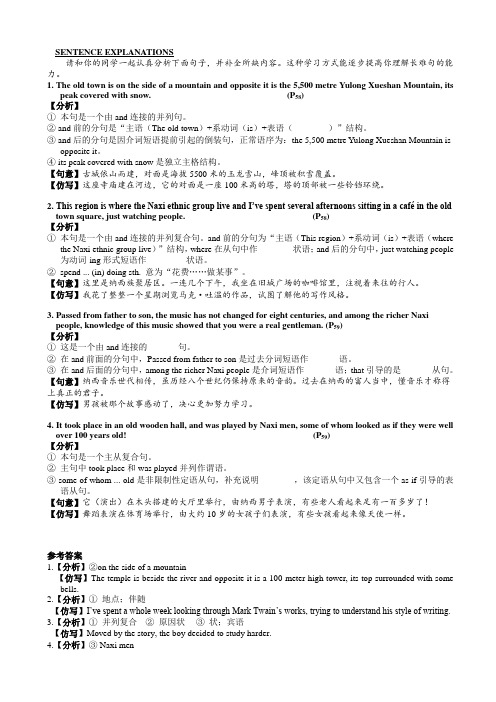
SENTENCE EXPLANATIONS请和你的同学一起认真分析下面句子,并补全所缺内容。
这种学习方式能逐步提高你理解长难句的能力。
1. The old town is on the side of a mountain and opposite it is the 5,500 metre Yulong Xueshan Mountain, itspeak covered with snow. (P58)【分析】①本句是一个由and连接的并列句。
② and前的分句是“主语(The old town)+系动词(is)+表语(________)”结构。
③ and后的分句是因介词短语提前引起的倒装句,正常语序为:the 5,500 metre Yulong Xueshan Mountain isopposite it。
④ its peak covered with snow是独立主格结构。
【句意】古城依山而建,对面是海拔5500米的玉龙雪山,峰顶被积雪覆盖。
【仿写】这座寺庙建在河边,它的对面是一座100米高的塔,塔的顶部被一些铃铛环绕。
______________________________________________________________________________2. This region is where the Naxi ethnic group live and I’ve spent several afternoons sitting in a café in the old town square, just watching people. (P58)【分析】①本句是一个由and连接的并列复合句。
and前的分句为“主语(This region)+系动词(is)+表语(wherethe Naxi ethnic group live)”结构,where在从句中作________状语;and后的分句中,just watching people 为动词-ing形式短语作_________状语。
高二英语外研版选修7 module 5 Ethnic Culture reading 教案

高二英语外研版选修7 module 5 Ethnic Culture reading教案高二外研版选修七Module5 Reading 教学设计教材分析:这是一篇日记,文章结构很清楚,主要介绍了云南丽江的美景和纳西文化。
学生对云南的美景很是向往,对少数民族的文化也很感兴趣,所以设计了图片吸引学生,激发他们的学习兴趣。
最后安排了做导游这个口语交际活动,使学生了解了云南,懂得了尊重少数民族文化。
Teaching aims: 1.To know more about Yunnan through studying2. To improve the students’ reading ability3. 掌握完全倒装和独立主格结构以及过去分词做状语4. To love ethnic culture and our beautiful country5. To improve the students’ ability of communication in English through performingImportant points:1.Improving the students’ reading ability2.Respecting ethnic culture and loving our beautiful country Difficult point:独立主格结构, introducing Yunnan in EnglishTeaching tool:multimediaTeaching process:Leading in:展示中国地图讨论自己喜欢的旅游胜地,引入云南的优美风光话题【设计说明】栩栩如生的图片让学生欣赏到云南的优美风光,使学生急切地想知道课文当中是怎样介绍云南的,为课文的学习做好铺垫.Reading:Step1: 词。
- 1、下载文档前请自行甄别文档内容的完整性,平台不提供额外的编辑、内容补充、找答案等附加服务。
- 2、"仅部分预览"的文档,不可在线预览部分如存在完整性等问题,可反馈申请退款(可完整预览的文档不适用该条件!)。
- 3、如文档侵犯您的权益,请联系客服反馈,我们会尽快为您处理(人工客服工作时间:9:00-18:30)。
课堂导学
文本感知
Ⅰ。
READING AND VOCABULARY
1.Which of the following is NOT true according to the passage “Simon Wakefield's Yunnan Diary”?
A.The Naxi language has existed for over 1000 years。
B.Naxi women play an important role in their society。
C。
The peak of Yulong Xueshan mountain is covered with snow.
D。
Tourists are now permitted to travel by car there。
2。
From the passage “The Bai Ethnic Group”,we know that_________.
A.the Bai's dialect is Chinese
B。
Yunhe halls can hold about 200 people
C。
the main crops of the Bai are corn and cotton
D。
the Bai live far from each other
3.The passage “The Bai Ethnic Group” also tells us that .
A。
the Bai has their own opera_________
B.the men wear short and wide trousers
C。
the Bai like the colour white less
D。
tea is served twice in the bai tea ceremony
Ⅱ。
Native Americans and Australian Aborigines
1.Where did native Americans come from?
A.American. B。
Asia。
C。
Africa。
D。
Europe.
2。
When were Native Americans made citizens of the US?
A.In 1924.
B.In the late 18th century.
C.In the 1960s.
D.Between 12 000 and 25 000 years ago。
3。
What was the population of Native American in the 18th century?A.1。
8 million. B。
10 million。
C.350 000.
D.40 000.
答案:Ⅰ.1.D2。
B 3.A
Ⅱ.1.B2。
A 3.C
难句透视
1。
The old town is on the side of a mountain and opposite it is the 5500 metre Yulong Xueshan Mountain,its peak covered with snow.
古城依山而建,对面是5500米的玉龙雪山,山峰被积雪覆盖。
剖析:its peak covered with snow 是由名词及后面的非谓语动词形式构成的独立主格结构.注意分词its peak 跟covered 是逻辑上的动宾关系,故用过去分词covered。
2。
Seen from above,the old town is a maze of canals,little bridges and tiny cobbled streets that tourists get lost in。
从上面俯看,古城就是一座由沟渠、小桥和鹅卵石铺成的街巷构成的迷宫,游人极易迷失其中。
剖析:Seen from above是过去分词短语作状语,句子的主语the old town跟动词see在逻辑上构成动宾关系.
3。
...it’s the women who run Naxi society and until recently Naxi women inherited all property.
管理纳西族社会的是妇女,而且近来还是由纳西族的妇女来继承全部财产。
剖析:It is/was.。
that/who.。
.强调句型.强调的是主语women。
4.It took place in an old wooden hall,and was played by Naxi men,some of whom looked as if they were well over 100 years old.
演出在木头搭建的大厅里举行,由纳西族男子表演,有些老人看起来足有100多岁了!
剖析:some of whom 为“some of+代词宾格" 引导的非限制性定语从句.可以转化为“and some of them looked as if.。
”.
5.However different we may appear to be at first,we are all the same,all equal。
无论起初我们看上去有多么不同,然而我们本质上是一样的,每个人都是平等的.
剖析:however引导让步状语从句,本句相当于“No matter how different we may appear to be at first,we are all the same,all equal。
”
6.In the distance was an ox working in a field.
远处有一头牛在地里干活。
剖析:本句为倒装句,强调地点状语,将in the distance 置于句首,句中主语和谓语完全倒装。
文中另外四个倒装句:
(1)Out of the jungle came an old woman.
(2)。
.here comes danger!
(3)Nearby were some chicks and a rooster,and a pig tied to a post. (4)Over the hills beyond was the most beautiful rainbow.
7。
It is generally agreed that Native Americans came across from Asia,somewhere between 12 000 and 25 000 years ago.
一般认为印第安人来自于亚洲某个地方,那是在12 000年到25 000年之前。
剖析:somewhere adv。
在某处;到某处
I left my book somewhere near here。
我把书落在附近某处。
8.For example,in the west people lived in villages and developed an agricultural economy,whereas in the east,where it was colder,people remained a hunting culture.
比如,西部人筑村而居发展起了农业经济,而在更冷的东部,人们依然处于狩猎文明阶段.
剖析:whereas conj.(引导与主句成对照或相反的从句)虽然;却;然而(事实是);相反地(while).。
